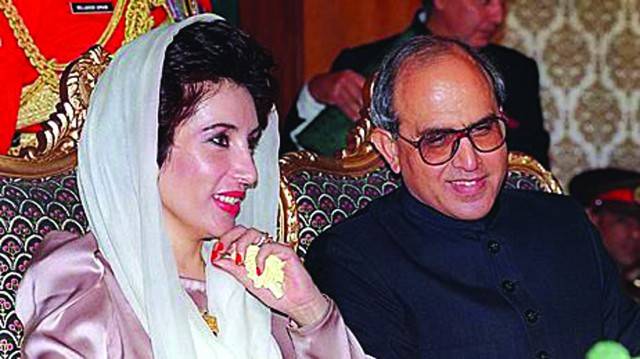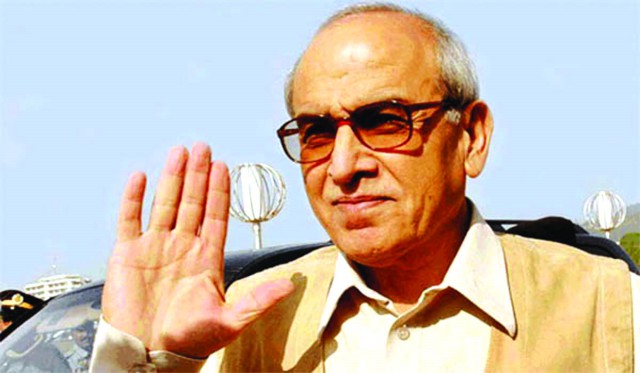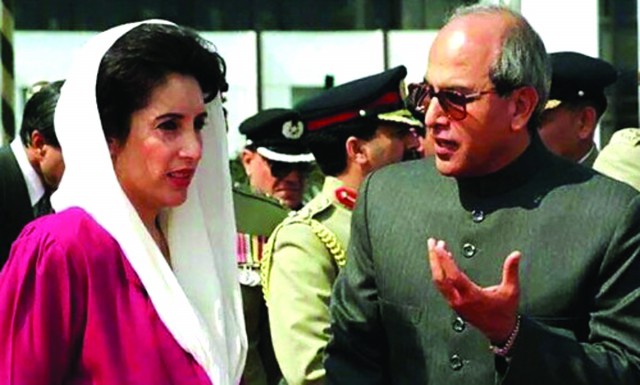
It is an unfortunate fact that Pakistan’s political history has been tainted with institutions and pillars of the state at loggerheads with each other – either in a struggle to attain power or else for restoration of power. Governments and heads of state have been dismissed through military coups, the Supreme Court and even Presidential orders. Speaking of Presidential orders, the last President to dismiss a government by using the infamous Eighth Amendment (which had Article 58-2B inserted within it) was Farooq Ahmad Khan Leghari.
Here is a brief overview of his story.
Farooq Ahmad Khan Leghari was the eighth President of Pakistan and served in office from the 14th of November 1993 until the day of his resignation on the 2nd of December 1997. Born into an influential Baloch tribal family in Choti Zareen (a village located in DG Khan, Punjab); Farooq Leghari earned the title of Sardar which indicated that he was the chief of his Leghari tribe. His immediate family were Seraiki-speaking Baloch people who all took part in active politics. His father and his grandfather were both broad-minded individuals who introduced their tribe to modern ideas. His father also went on to take a part in the Pakistan Movement and was a political prisoner in 1946.

Farooq Ahmad Khan Leghari spent his schooling days at Aitchison College, located in Pakistan’s cultural hub of Lahore. At Aitchison, he excelled as an individual to become the head boy and then eventually graduated at the top of his class and was awarded as the “Best Graduating Student” in 1957. Upon passing out from Aitchison College, Farooq Leghari gained a BA degree in Economics from Forman Christian College Lahore in 1960. His university days were spent at St. Catherine’s College, Oxford, where he studied Philosophy, Politics and Economics. Apart from excelling in academics, Farooq Leghari was quite the athlete as well. During his school days at Aitchison College, he captained the tennis team and also played polo.
Returning to Pakistan from university, Farooq Leghari joined the Central Superior Services (CSS) and was posted in East Pakistan (Bangladesh) before returning back to West Pakistan (today Pakistan). In 1973 he left the CSS and joined the ever promising Pakistan Peoples Party (PPP) on the request of it’s founding father Shaheed Zulfikar Ali Bhutto. During the 1980s, his political activism reached a peak where he started doing demonstrations against General Zia-ul-Haq’s regime and was even sent to jail several times by the police. After General Zia’s assassination, elections took place in 1988 where the PPP won a majority and formed the government. Farooq Leghari was appointed Minister for Water and Power by PPP heir Shaheed Mohtarma Benazir Bhutto. Post 1988 and mainly throughout the 1990s, Pakistan saw a very turbulent political period where governments were repeatedly dismissed. In 1993, Farooq Leghari joined the setup of caretaker Prime Minister and technocrat Moeenuddin Qureshi as Finance Minister. When the tenure of the caretaker setup was over, and upon successful victory by the PPP in the 1993 general elections, Farooq Leghari was appointed Foreign Minister by then Prime Minister Benazir Bhutto. However, destiny would have a more important role for him than maintaining ties with the rest of the world on the foreign front; and that role would be in the office of the President of Pakistan.

Farooq Leghari was highly regarded as a man of integrity, principles and honesty as opposed to politicians who have been accused of mass corruption and white collar crimes. These qualities gained the attention of Benazir Bhutto, who nominated him for the Presidency. He accepted the nomination and ran against PML-N candidate Wasim Sajjad. He won the majority vote and became the eighth President of Pakistan.
During the second tenure of PPP in power, the country witnessed significant turbulence. The law and order situation in the country was falling apart, especially in Karachi – where there was a spree of extra judicial killings. Back in those days, Karachi witnessed a weekly two-day strike every Thursday and Friday. The second term also saw internal political rifts between the President and Prime Minister over appointment of judges to the Supreme Court. Tensions reached an ultimate high when President Farooq Leghari raised the issue of corruption by senior PPP leaders. During all this, Pakistan’s economic situation was worsening and it seemed as though the country was heading towards bankruptcy. Farooq Leghari was patiently witnessing all this until a time came when he felt that the limits of his patience were exceeded. On the 5th of November 1996, President Farooq Leghari used the Eighth Amendment in the constitution of Pakistan to dismiss the PPP government – citing reasons of corruption, incompetence and lawlessness. He was the second President in the history of Pakistan to use the Eighth Amendment. In an interview several years later, Farooq Leghari said that if he had not dismissed the PPP government at that time, Pakistan would have gone into default after ten days.
After dismissing the PPP government, elections were held where PML-N won the majority mandate. In order to ensure that history does not repeat itself, former Prime Minister Nawaz Sharif repealed the Eighth Amendment which left the role of the President as a ceremonial figurehead. Once again, matters between the executive and judiciary brewed which had the effect of Farooq Leghari’s own Presidency coming under threat. On the 2nd of December 1997, Farooq Leghari resigned as President of Pakistan to avoid impeachment proceedings against him. Post presidency, Farooq Leghari formed his own political party known as the Milat Party, which went on to form an alliance with seven other political parties. This alliance was called The National Alliance. It went on to win sufficient seats in the 2002 elections to form a coalition government with PML-Q, backed by former President General Pervez Musharraf.
May 29th will mark the 81st birth anniversary of the former President. He will be most popularly remembered for dismissing the PPP government. Some commentators suggest that his decision to do so was in haste. However, others argue that he could have dismissed the government much earlier in his term as President, but decided not to – as he wanted the government to function according to the constitution in a democratic manner.
Farooq Ahmad Khan Leghari breathed his last on the 20th of October 2010 in Rawalpindi, after a long illness related to heart problems.
Here is a brief overview of his story.
Farooq Ahmad Khan Leghari was the eighth President of Pakistan and served in office from the 14th of November 1993 until the day of his resignation on the 2nd of December 1997. Born into an influential Baloch tribal family in Choti Zareen (a village located in DG Khan, Punjab); Farooq Leghari earned the title of Sardar which indicated that he was the chief of his Leghari tribe. His immediate family were Seraiki-speaking Baloch people who all took part in active politics. His father and his grandfather were both broad-minded individuals who introduced their tribe to modern ideas. His father also went on to take a part in the Pakistan Movement and was a political prisoner in 1946.

Farooq Ahmad Khan Leghari spent his schooling days at Aitchison College, located in Pakistan’s cultural hub of Lahore. At Aitchison, he excelled as an individual to become the head boy and then eventually graduated at the top of his class and was awarded as the “Best Graduating Student” in 1957. Upon passing out from Aitchison College, Farooq Leghari gained a BA degree in Economics from Forman Christian College Lahore in 1960. His university days were spent at St. Catherine’s College, Oxford, where he studied Philosophy, Politics and Economics. Apart from excelling in academics, Farooq Leghari was quite the athlete as well. During his school days at Aitchison College, he captained the tennis team and also played polo.
He was the second President in the history of Pakistan to use the Eighth Amendment
Returning to Pakistan from university, Farooq Leghari joined the Central Superior Services (CSS) and was posted in East Pakistan (Bangladesh) before returning back to West Pakistan (today Pakistan). In 1973 he left the CSS and joined the ever promising Pakistan Peoples Party (PPP) on the request of it’s founding father Shaheed Zulfikar Ali Bhutto. During the 1980s, his political activism reached a peak where he started doing demonstrations against General Zia-ul-Haq’s regime and was even sent to jail several times by the police. After General Zia’s assassination, elections took place in 1988 where the PPP won a majority and formed the government. Farooq Leghari was appointed Minister for Water and Power by PPP heir Shaheed Mohtarma Benazir Bhutto. Post 1988 and mainly throughout the 1990s, Pakistan saw a very turbulent political period where governments were repeatedly dismissed. In 1993, Farooq Leghari joined the setup of caretaker Prime Minister and technocrat Moeenuddin Qureshi as Finance Minister. When the tenure of the caretaker setup was over, and upon successful victory by the PPP in the 1993 general elections, Farooq Leghari was appointed Foreign Minister by then Prime Minister Benazir Bhutto. However, destiny would have a more important role for him than maintaining ties with the rest of the world on the foreign front; and that role would be in the office of the President of Pakistan.

Farooq Leghari was highly regarded as a man of integrity, principles and honesty as opposed to politicians who have been accused of mass corruption and white collar crimes. These qualities gained the attention of Benazir Bhutto, who nominated him for the Presidency. He accepted the nomination and ran against PML-N candidate Wasim Sajjad. He won the majority vote and became the eighth President of Pakistan.
During the second tenure of PPP in power, the country witnessed significant turbulence. The law and order situation in the country was falling apart, especially in Karachi – where there was a spree of extra judicial killings. Back in those days, Karachi witnessed a weekly two-day strike every Thursday and Friday. The second term also saw internal political rifts between the President and Prime Minister over appointment of judges to the Supreme Court. Tensions reached an ultimate high when President Farooq Leghari raised the issue of corruption by senior PPP leaders. During all this, Pakistan’s economic situation was worsening and it seemed as though the country was heading towards bankruptcy. Farooq Leghari was patiently witnessing all this until a time came when he felt that the limits of his patience were exceeded. On the 5th of November 1996, President Farooq Leghari used the Eighth Amendment in the constitution of Pakistan to dismiss the PPP government – citing reasons of corruption, incompetence and lawlessness. He was the second President in the history of Pakistan to use the Eighth Amendment. In an interview several years later, Farooq Leghari said that if he had not dismissed the PPP government at that time, Pakistan would have gone into default after ten days.
After dismissing the PPP government, elections were held where PML-N won the majority mandate. In order to ensure that history does not repeat itself, former Prime Minister Nawaz Sharif repealed the Eighth Amendment which left the role of the President as a ceremonial figurehead. Once again, matters between the executive and judiciary brewed which had the effect of Farooq Leghari’s own Presidency coming under threat. On the 2nd of December 1997, Farooq Leghari resigned as President of Pakistan to avoid impeachment proceedings against him. Post presidency, Farooq Leghari formed his own political party known as the Milat Party, which went on to form an alliance with seven other political parties. This alliance was called The National Alliance. It went on to win sufficient seats in the 2002 elections to form a coalition government with PML-Q, backed by former President General Pervez Musharraf.
May 29th will mark the 81st birth anniversary of the former President. He will be most popularly remembered for dismissing the PPP government. Some commentators suggest that his decision to do so was in haste. However, others argue that he could have dismissed the government much earlier in his term as President, but decided not to – as he wanted the government to function according to the constitution in a democratic manner.
Farooq Ahmad Khan Leghari breathed his last on the 20th of October 2010 in Rawalpindi, after a long illness related to heart problems.

